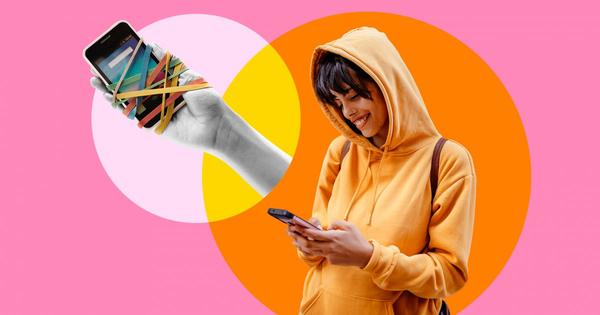At the very thought of finding herself in a place without Wi-Fi, Annette blanched. If she notices that her battery is about to drop below 50%, this dynamic executive has only one thing in mind: find a way to recharge it as quickly as possible. And if, by the greatest of misfortunes, she has to spend a whole day at the office without her smartphone, which had not been found at the time of departure, the quadra is in a state of disarray and intense stress until she has access again.
Read also >>> Testimonials: the fear of losing their phone ruins their lives
What is nomophobia?
Annette suffers from nomophobia – voted word of the year 2018 by the Cambridge Dictionary – a term resulting from the contraction of "no mobile phone phobia", which is therefore the fear of not having your phone near you or be unable to use it. This new anxiety reflects our multiple digital dependencies because the laptop is a tool that facilitates addictions of all kinds, just like the practice of video games. The addiction to the smartphone starts, it, from the moment when one begins to lose control of its use. When you can't resist, for example, answering a text message while driving or spending time on social networks.
Where does nomophobia come from?
It used to be that most people feared losing their keys or wallet, but today it's the laptop that's got all the attention. “The telephone is not only used to receive and make calls, underlines the digital sociologist, Catherine Lejealle. It has an affective dimension, because it contains our discussion threads, our diaries, our address books, our photos and our favorite music. Our mobile also serves as a GPS, digital walkman or cookbook. It still serves as an alarm clock, a watch, or even a flashlight. In short, it has become an indispensable utility”. Our whole life, or almost, is in our phone. Therefore, we understand that misplacing it, forgetting it or having it stolen is a source of anxiety.
The rise of smartphones, social networks, but also continuous information, have also generated a syndrome specific to our time: Fomo (Fear Of Missing Out), which refers to the fear of missing out. Something.
Manifestations and symptoms of nomophobia

Like any phobic, the nomophobe always begins by adopting avoidance behavior. He feels his trouser (or coat) pocket a hundred times a day to make sure his phone is there. When his toy is at hand – in other words, all the time! – he consults it compulsively every two minutes and tirelessly scrolls the screen without really knowing why. Deprived of his phone, the nomophobe feels an inner emptiness that anguishes him. He “feels dead”.
Teenagers and dynamic executives are the most affected by this disorder, which is becoming a real addiction. The first fear being separated from their smartphone, for fear of being isolated from the group by no longer having access to social networks. The anxiety of performance intimate to the seconds to be constantly reachable.
Phone addiction solutions and treatments
This exacerbated behavior causes conflicts with the environment and often leads to social isolation. It can also trigger sleep disturbances, even depression. It is therefore necessary to put in place limits on the use of the telephone. Set a maximum connection time, mute your notifications, switch your screen to black and white (just to find it less attractive)… So many recipes that have proven themselves in the management of nomophobia.
But if they are not enough for your digital withdrawal and your nomophobia is ruining your life and tainting your health, know that there are ways to get rid of them. Thalassotherapy centers and luxury hotels already offer a wealthy clientele digital detox courses, with strong yoga and meditation.
“Cognitive-behavioral therapies (CBT) are also very effective, slips the psychiatrist Jérôme Palazzolo, author of “I free myself from my phobias” (Puf). They consist in gradually disaccustoming the person to the presence of his smartphone “. The therapist recommends exercises to be practiced out of consultation – “forgetting” your phone while going shopping or not checking your emails for a weekend – in order to regularly spare time without connection. It also encourages the patient to rediscover pleasure with simple things, such as reading, cooking or seeing friends. The goal of therapy is not to eliminate the cell phone, but to regulate its use.
Possibility of treatment and healing of nomophobia
Nomophobia is very treatable. A dozen sessions with a psychotherapist, or with a psychiatrist, whose consultations have the advantage of being supported, are generally enough to teach the patient to put himself in off mode, without feeling anxious.
As for Annette, not sure she's ready to follow a course or therapy to learn how to do without her smartphone. For the time being, the young woman plans rather to acquire the latest Iphone 13 very quickly. She has heard that a shortage of electronic chips could lead to a shortage of stock of the flagship product of the apple brand before Christmas. …










SOS Public Hospital: our revelation...
The best smartphones for gaming in...
Free tips in video: Free Mobile off...
Google Maps: activate the new widge...